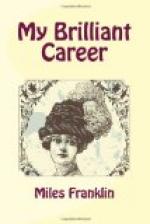The next unpleasant discovery I made in regard to myself was that I was woefully out of my sphere. I studied the girls of my age around me, and compared myself with them. We had been reared side by side. They had had equal advantages; some, indeed, had had greater. We all moved in the one little, dull world, but they were not only in their world, they were of it; I was not. Their daily tasks and their little pleasures provided sufficient oil for the lamp of their existence—mine demanded more than Possum Gully could supply. They were totally ignorant of the outside world. Patti, Melba, Irving, Terry, Kipling, Caine, Corelli, and even the name of Gladstone, were only names to them. Whether they were islands or racehorses they knew not and cared not. With me it was different. Where I obtained my information, unless it was born in me, I do not know. We took none but the local paper regularly, I saw few books, had the pleasure of conversing with an educated person from the higher walks of life about once in a twelvemonth, yet I knew of every celebrity in literature, art, music, and drama; their world was my world, and in fancy I lived with them. My parents discouraged me in that species of foolishness. They had been fond of literature and the higher arts, but now, having no use for them, had lost interest therein.
I was discontented and restless, and longed unendurably to be out in the stream of life. “Action! Action! Give me action!” was my cry. My mother did her best with me according to her lights. She energetically preached at me. All the old saws and homilies were brought into requisition, but without avail. It was like using common nostrums on a disease which could be treated by none but a special physician.
I was treated to a great deal of harping on that tiresome old string, “Whatsoever your hand findeth to do, do it with all your might.” It was daily dinned into my cars that the little things of life were the noblest, and that all the great people I mooned about said the same. I usually retorted to the effect that I was well aware that it was noble, and that I could write as good an essay on it as any philosopher. It was all very well for great people to point out the greatness of the little, empty, humdrum life. Why didn’t they adopt it themselves?
The toad beneath the harrow knows
Exactly where each tooth-point goes.
The butterfly upon the road
Preaches contentment to the toad.
I wasn’t anxious to patronize the dull kind of tame nobility of the toad; I longed for a few of the triumphs of the butterfly, decried though they are as hollow bubbles. I desired life while young enough to live, and quoted as my motto:
Though the pitcher that goes to the sparkling rill
Too oft gets broken at last,
There are scores of others its place to fill
When its earth to the earth is cast.
Keep that pitcher at home, let it never roam,
But lie like a useless clod;
Yet sooner or later the hour will come
When its chips are thrown to the sod.




